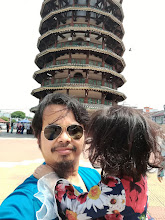Complementary & Integrative Medicine
I had an opportunity to attend a course on Traditional Chinese Medicine (TCM) at Harvard Medical School recently, which was co-organised by Hong Kong Baptist University (HKBU). HKBU has the a particular school called School of Chinese Medicine, and its objectives are to view TCM according to today's standard, with its improved precision on treatment in area of translational medicine as well as new drug discovery.
Instead of viewing the TCM as something alien, Harvard Medical School acknowledged that TCM is there to stay, especially when the tradition has been around for more than 2500 years,much longer than the current modern understanding of disease.
Certainly there are many differences with the 2 approaches. Modern medicine focus on the aetiology and pathophysiology of diseases, and try to treat disease based on that. Based on what I understand, TCM treatment is based on symptoms. As a perspective, it is estimated that modern medicine has roughly 200-300 presenting symptoms, while TCM has 2000-3000 symptoms in its dictionary. For example, in Rheumatoid Arthritis, while we ask about pain and distribution of pain in the joints, the TCM practitioner would ask about 'cold' or 'hot' or 'warming up' or 'cooling down' type of pain.
Some authors have attempted to marry these 2 concepts together. In series of publications by Zhang Chi et al in 2011 (searchable in pubmed), the author was suggesting that the modern treatment of RA with MTX/SSZ may be more beneficial in patients with 'cold' symptoms instead of 'hot' symptoms. Some theory of what is hot and cold was proposed. For example, 'hot' pattern of disease is more to do with fatty acid metabolism, while cold pattern is to do with JAK-STAT cascade (whatever it is...) or RNA splicing.
While acknowledging that there are more to study, especially in terms of bringing TCM up to the understanding of current modern medical world, we should view the different methodology of treating diseases as complementary and some part as integrated together. To do RCT on TCM can be challenging as TCM uses cocktail of different compounds, instead of 1 persumably active ingredients.
One very successful story of how TCM made an impact in the modern world of medicine is through the formulation of Artemisinin, a 'new' drug for treatment of malaria. Prof Tu was given a Nobel Prize in Medicine for this achievement in 2015. The story of how she manage to make this old medicine up to the current standard deserves a new essay by itself, but what has been told is that she was having difficulty making a stable ingredient. She went back to read a manuscript of thousand years old, and she noticed that the way she extracted it was wrong. Instead of extraction under heat which she has been doing all along, she used 'cold' extract as suggested by the ancient text, and she created a stable compound to treat malaria.
In Malaysia, our plants also have a lot of pharmaceutical potential, but we are lacking behind in terms of making them up to the standard of today's medicine. Learning from this, we should be proud of what we have. And instead of pushing them aside, we should try to investigate and integrate them (once they are scientifically proven) into our daily practice.

